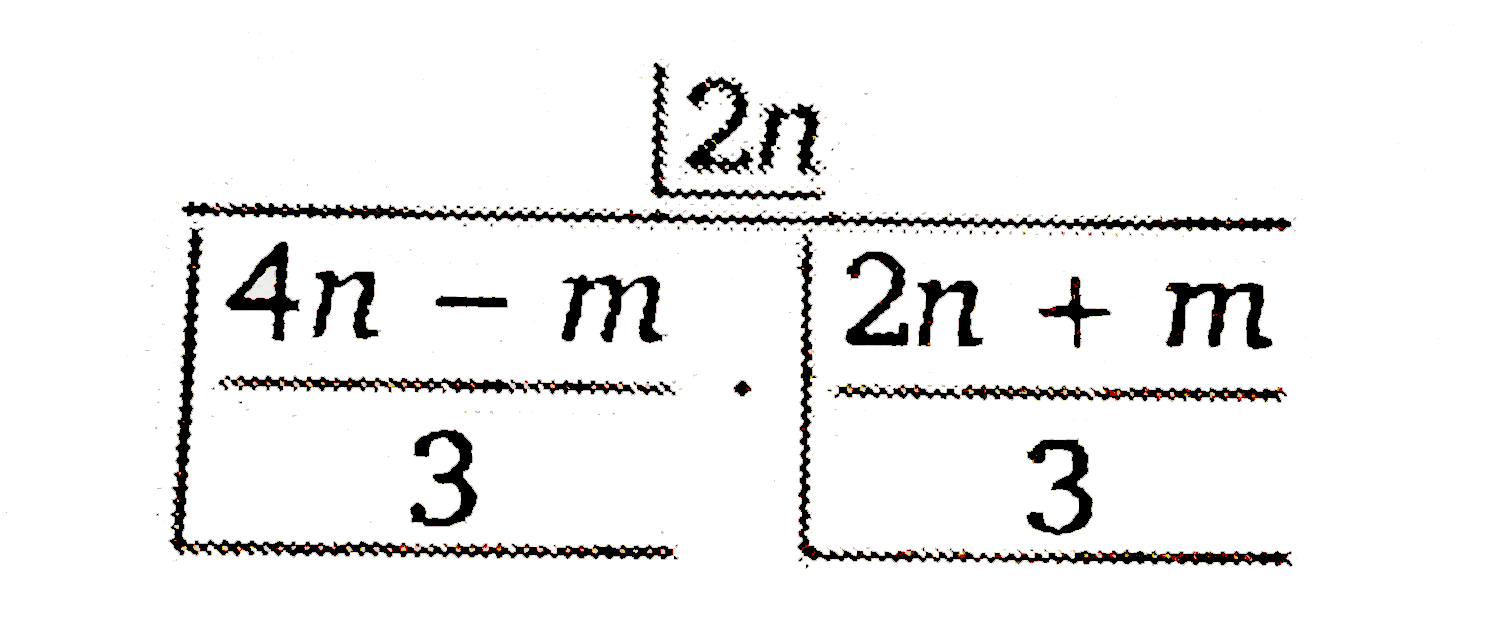The coefficient of xn in the expansion of a+bx+cx2ex is
(−1)nn!{cn2−(b+c)(n+a}
(−1)nn!{cn2+(b+c)(n+a}
(−1)nn!{cn2+(b+c)(n−a}
none of these
To find the coefficient of xn in the expansion of a+bx+cx2ex, we can follow these steps:
Step 1: Rewrite the expression
We can rewrite the expression as:
a+bx+cx2⋅e−x
This is because 1ex=e−x.
Step 2: Expand e−x
The Taylor series expansion for e−x is:
e−x=∞∑k=0(−x)kk!=1−x+x22!−x33!+…
This can be expressed as:
e−x=∞∑k=0(−1)kxkk!
Step 3: Multiply the series
Now, we need to multiply the polynomial a+bx+cx2 by the series expansion of e−x:
(a+bx+cx2)⋅(∞∑k=0(−1)kxkk!)
Step 4: Find the coefficient of xn
To find the coefficient of xn, we consider the contributions from each term in the polynomial:
1. From a, we need the coefficient of xn from e−x, which is (−1)nn!.
2. From bx, we need the coefficient of xn−1 from e−x, which is (−1)n−1(n−1)!.
3. From cx2, we need the coefficient of xn−2 from e−x, which is (−1)n−2(n−2)!.
Thus, the coefficient of xn can be expressed as:
Coefficient of xn=a⋅(−1)nn!+b⋅(−1)n−1(n−1)!+c⋅(−1)n−2(n−2)!
Step 5: Combine the terms
Now we can combine these terms:
=a⋅(−1)nn!+b⋅(−1)n−1⋅nn!+c⋅(−1)n−2⋅n(n−1)n!
This simplifies to:
=(−1)nn!(a+b⋅n⋅(−1)+c⋅n(n−1)⋅(−1)2)
=(−1)nn!(a−bn+cn(n−1))
Final Result
Thus, the coefficient of xn in the expansion of a+bx+cx2ex is:
(−1)nn!(a−bn+cn(n−1))
We can rewrite the expression as:
a+bx+cx2⋅e−x
This is because 1ex=e−x.
The Taylor series expansion for e−x is:
e−x=∞∑k=0(−x)kk!=1−x+x22!−x33!+…
This can be expressed as:
e−x=∞∑k=0(−1)kxkk!
Now, we need to multiply the polynomial a+bx+cx2 by the series expansion of e−x:
(a+bx+cx2)⋅(∞∑k=0(−1)kxkk!)
To find the coefficient of xn, we consider the contributions from each term in the polynomial:
1. From a, we need the coefficient of xn from e−x, which is (−1)nn!.
2. From bx, we need the coefficient of xn−1 from e−x, which is (−1)n−1(n−1)!.
3. From cx2, we need the coefficient of xn−2 from e−x, which is (−1)n−2(n−2)!.
Coefficient of xn=a⋅(−1)nn!+b⋅(−1)n−1(n−1)!+c⋅(−1)n−2(n−2)!
Now we can combine these terms:
=a⋅(−1)nn!+b⋅(−1)n−1⋅nn!+c⋅(−1)n−2⋅n(n−1)n!
This simplifies to:
=(−1)nn!(a+b⋅n⋅(−1)+c⋅n(n−1)⋅(−1)2)
=(−1)nn!(a−bn+cn(n−1))
Thus, the coefficient of xn in the expansion of a+bx+cx2ex is:
(−1)nn!(a−bn+cn(n−1))
Topper's Solved these Questions
- EXPONENTIAL AND LOGARITHMIC SERIESBOOK - OBJECTIVE RD SHARMA ENGLISHCHAPTER - EXPONENTIAL AND LOGARITHMIC SERIESEXERCISE - Section I - Solved Mcqs
26 Videos
- EXPONENTIAL AND LOGARITHMIC SERIESBOOK - OBJECTIVE RD SHARMA ENGLISHCHAPTER - EXPONENTIAL AND LOGARITHMIC SERIESEXERCISE - Section II - Assertion Reason Type
5 Videos
- ELLIPSEBOOK - OBJECTIVE RD SHARMA ENGLISHCHAPTER - ELLIPSEEXERCISE - Chapter Test
29 Videos
- HEIGHTS AND DISTANCESBOOK - OBJECTIVE RD SHARMA ENGLISHCHAPTER - HEIGHTS AND DISTANCESEXERCISE - Exercise
45 Videos
Similar Questions
Knowledge Check
The coefficient of xn in the expansion of (1+x)(1−x)n is
An(n2+2)(3n+1)24Bn(n2−1)(3n+2)24Cn(n2+1)(3n+4)24DNone of these
Find the coefficient of x5 in the expansion of (2+3x+4x2)ex
View SolutionCoefficient of xn in the expansion of (1+x)n1−x
View SolutionThe coefficient of xn in the expansion of loga(1+x) is
View SolutionThe coefficient of xnin the expansion of
(1+x1−x)2, is
View SolutionThe coefficient of xn in the expansion of (1+x)2(1−x)3, is
View SolutionThe coefficient of xn in the expansion of (1+x)(1−x)n is
View SolutionIf 'n' is a positive integer then prove that the coefficient foxm in the expansion of (x2+1x)2n is :

View Solution
